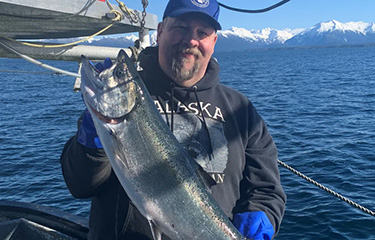Fishing groups and the U.S. state of Alaska are lashing out after a U.S. federal judge effectively shut down the king salmon troll fishery in Southeast Alaska in response to a lawsuit filed by the Wild Fish Conservancy (WFC).
In a lengthy statement, the Seafood Producers Cooperative expressed “disappointment and frustration” with the outcome.
“SPC and our fishermen will survive this debacle, as we have survived many others in the past, but the pain and unnecessary hardship that this frivolous lawsuit places on our fleet if our access to king salmon goes through to WFC’s intended result will long be remembered in any future conversations,” SPC President Norman Pillen said in a statement.
The legal battle began in 2020, when WFC sued the National Marine Fisheries Service (NFMS). The nonprofit environmental group argued that the commercial king salmon harvest and hatchery programs were depriving wild orcas of their natural food source, starving them and leading to a decline in the number of wild orcas living in Puget Sound.
WFC claimed its first victory in 2021, when the U.S. District Court for the Western District of Washington agreed that a 2019 Southeast Alaska biological opinion relied on uncertain information and that NFMS failed to conduct a NEPA analyses to support its incidental take statement for the fishery.
WFC followed up by asking the court to issue a temporary restraining order, and on 2 May, 2023, U.S. District Court Judge Richard Jones did just that, vacating the ITS and remanding the 2019 biological opinion to NMFS to fix the errors. That decision effectively closes the chinook salmon summer and winter commercial troll fishery.
The WWC hailed the decision as “a landmark order,” stating that the overharvest of king salmon is Southeast Alaska jeopardizes the survival of both killer whales and wild king salmon populations.
“This court decision is the largest victory for Southern Resident killer whale recovery in decades and will be celebrated internationally,” WFC Executive Director Emma Helverson said in a statement. “What’s more, by allowing far more wild chinook to return home to their spawning grounds, this action is also helping to recover and restore wild chinook from rivers throughout Oregon, Washington, and British Columbia, essential to rebuilding both populations in the long-term.”
Industry groups, however, say that the ruling relies on a technicality and won’t do anything to help wild orcas.
“As a wild salmon-focused environmental organization, SalmonState condemns the Wild Fish Conservancy’s misguided, irresponsible litigation — which in all probability won’t save a single endangered killer whale, but will ruin the livelihoods of thousands of Southeast Alaska’s most committed, long-term conservationists and wild salmon allies,” SalmonState Executive Director Tim Bristol. “This is an abuse of the Endangered Species Act by out of touch, ideological, serial litigants.”
SalmonState argues that habitat destruction, dams, climate change and inbreeding are the major issues contributing to killer whale decline, not the Southeast Alaska troll fishery.
SPC’s Pillen went further, claiming WFC targeted the Southeast Alaska troll fishery because it didn’t have the financial support to defend itself.
“The WFC found a technicality in NOAA’s biological opinion for troll-caught king salmon. No other fishing gear groups are being attacked and other commercial and sports fishermen in the region (and in Puget Sound) will continue to harvest king salmon,” Pillen said. “The WFC thereby identified a potential easy win and targeted the industry group with the least amount of financial backing to fight this argument. (The troll fleet is made up of small mom and pop family-owned small boats.) I view this as an intentional and malicious move to drum up financial and popular support to finance the next pernicious lawsuit against commercial fishermen.”
Alaska Department of Fish and Game Commissioner Doug Vincent-Lang also pointed out that the lawsuit doesn’t target fisheries off the coasts of Washington and Oregon, which have a much larger impact on orcas. Vincent-Lang threatened that if the decision stands, he will look to have other west coast fisheries shut down.
“Alaska will not tolerate the suspension of its fisheries while other west coast fisheries equally or more impactful to killer whales and dependent upon the same hatchery mitigation actions, but not the target of this lawsuit, are allowed to proceed,” he said. “If this decision sticks, we will be looking at having all fisheries that affect these killer whales being treated equally under the law.”
The Alaska state government has appealed the decision to the 9th Circuit Court and requested a stay.
“Vacating the ITS and effectively closing the fishery is a radical step. We’ll continue to pursue every available avenue in defense of Alaska’s fisheries,” Alaska Attorney General Treg Taylor said.
With Alaska’s 2023 salmon season set to begin on May 15, the Alaska state government says it is up to NMFS to get new documents approved in order to support the traditional 1 July king salmon fishery opening.
In a brief statement, NOAA Fisheries said it was “working expeditiously to address the court's order.”
Photo courtesy of Alaska Gold Seafood







